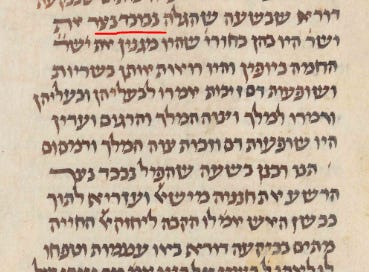Nevuchad Netzar as Two Words?
Nevuchadnezzar is mentioned on Sanhedrin 92. While following along on Hachi Garsinan, I saw that several manuscripts separated the name into two. Thus,
Vilna made it one word (but on daf 96?, has an instance with two words). Meanwhile, older printings of Venice and Barko have two words. So too with two words Munich 95 and Florence 8-9. Yad HaRav Herzog has a single word.
Here is an example Florence 8-9:
or a bit later on the page, with a line break making it entirely clear:
We can search on Sefaria to get the many instances of this word. Note that if we wanted to really divide the name, we might have selected a different breaking point. This is because the name derives from Nabû-kudurri-uṣur, meaning “Nabu (a certain deity) protect my heir."
There is a nice analysis in Jacob Epstein’s Introductions to Amoraic Literature, Mevo’ot LeSifrut HaAmoraim. He writes:
לנבוכד נצר וכו' על נבוכד נצר] בכ"י מ': לנבוכ' נצר … על נבוכ' נצ'. ובכ"י פ' לנבוכד נצר – על נבו' נצר. וכן נכתב תמיד בירוש' ד' ויניציא, כמו ברכות יג ע"א, שביעית ספ"ד, לה ע"ג, תענית פ"ד סט ע"ב ועוד. וכ"ה ברות רבה פ"ג ב בד"ו ופפד"מ וב"ר פל"ט יב בג' כי"י וילקוט. וכן ב"ר פמ"ב (פמ"א) ג' בד"ו וב' כי"י, ובן ב"ר לז ד בד"ו ובכי"י אחדים, וכך בויק"ר פי"א ז בד"ו, ושם פי"ג ה' בד"ו ופפד"מ (ב"פ ופעם ב' קרא דדניאל ג יט), וכן רות רבה פתיחתא ושם האיש. ורשב"ג בשיריו "נבוכד", וכך מפרשים הרקמה ורשב"ח "נצרים" (ירמ' ד טז) – נבוכדנצר.
ואמנם במס' סופרים פ"ה יא נחשב "נבוכדנצר" בין השמות שאין נחלקין, אבל בירוש' מגילה פ"א, עב רע"א לא נחשב נבוכדנצר ביניהם. ובכל אופן נראה גם ממס' סופרים שיש שחלקוהו לשנים.
He points to a lot of sources in Yerushalmi and Bereshit Rabba. Then, notes a conflict between Masechet Soferim, which lists Nevuchadnezzar as a never-divided word, and a Yerushalmi.
Soferim 5:10-11 states:
אלו שמות הנחלקין בית אל בית און באר שבע צפנת פענח פוטי פרע בן אוני ידיד יה הללו יה (וחרה אף וחרה אפי) רבי יוסי אומר אין נחלקין אבל הכל שוין שאין חולקין עמיאל עמינדב צוריאל צורישדי:
The following names are to be divided: Beth-el, Beth-’awen, Beer-sheba, Ẓofenath-pa’neaḥ, [37b] Poṭi-fera, Ben-’oni, Yedid-yah, Halelu-yah. R. Jose says: These must not be divided. All, however, agree that there must be no breaking up of ‘Ammi’el, ‘Amminadab, Ẓuri’el, Ẓurishaddai.
אלו שמות שאין נחלקין ישראל געתם פוטיפר נבוכדנצר (עמיאל צוריאל צורישדי):
The following names may not be broken up: Yisra’el, Ga’tham, Poṭifar, Nebukadneẓẓar.
with emphasis on the second statement.
I would note that Tractate Sefer Torah 5:12, which at its beginning is almost identical to tractate Soferim, has the same, but without the Nevuchadnezzar statement:
אלו שמות הנחלקים בית אל בית און באר שבע פוטיפרע צפנת פענח חרה אף חרה אפי ר׳ יוסי אומר אין נחלקים הכל שוים שאין חולקים עמיאל עמינדב צוריאל צורישדי:
The following names are to be divided: Beth-’el, Beth-’awen, Be’er-sheba‘, Poṭifera‘, Ẓafenath-pa‘neaḥ, [and the words] ḥarah ’af, ḥarah ’appi. R. Jose says: These must not be divided. All agree that there must be no breaking up of ‘Ammiel, ‘Amminadab, Ẓuri’el, Ẓurishaddai.
Maybe that is what Epstein means that there is internal disagreement in Soferim about Nevuchadnezzar? Either that or because the separation of statements, so that the reisha does not mention it.
He also notes Yerushalmi Megillah 1:9, where alongside names like Potifera, we encounter and absence of the name Nevuchadnezzar:
תַּנֵּי. רִבִּי יוֹסֵי אוֹמֵר. שֶׁלְּבֵית חֲגִירָה כּוֹתְבָנִים אוּמָּנִים הָיוּ בִירוּשָׁלִַם. הָיוּ מוֹחֲקִין צְבָאוֹת. שֶׁכֵּן הוּא שֵׁם חוֹל בְּמָקוֹם אַחֵר. וּפָֽקְד֛וּ שָׂרֵ֥י צְבָא֖וֹת בְּרֹ֥אשׁ הָעָֽם׃ כָּל־הַשֶּׁמוֹת הַכְּתוּבִים בְּאָבִינוּ אַבְרָהָם קוֹדֶשׁ חוּץ מֵאֶחָד שֶׁהוּא חוֹל. וַיְהִ֞י כַּֽאֲשֶׁ֧ר הִתְע֣וּ אוֹתִי אֱלֹהִים֘ מִבֵּ֣ית אָבִי֒. וְיֵשׁ אוֹמְרִים. אַף הוּא קוֹדֶשׁ. שֶׁאִילוּלֵי אֱלֹהִים כְּבָר הִתְעוּ אוֹתִי. כָּל־הַשֵּׁמוֹת הַכְּתוּבִים בְּמִיכָה אַף עַל פִּי שֶׁהֵן כְּתוּבִין בְּיוּ״ד וּבְהֵ״א הֲרֵי אֵילּוּ חוֹל חוּץ מֵאֶחָד שֶׁהוּא קוֹדֶשׁ. כָּל־יְמֵ֛י הֱי֥וֹת בֵּית־הָאֱלֹהִ֖ים בְּשִׁילֹֽה׃ כָּל־הַשֵּׁמוֹת הַכְּתוּבִים בְּנָבוֹת אַף עַל פִּי שֶׁהֵן כְּתוּבִים בְּאֲלֵ״ף לַמֵד הֲרֵי אֵילּוּ קוֹדֶשׁ. בֵּרַ֥ךְ נָב֛וֹת אֱלֹהִ֖ים וָמֶ֑לֶךְ. אֲבָל חַנּוּן וְרַחוּם אֶרֶךְ אַפַּיִם וְרַב חֶסֶד מֶלֶךְ מְלָכִים מְרוֹמָם וְגָדוֹל וְנוֹרָא וְעֶלְיוֹן אַדִּיר צַדִּיק יָשָׁר חָסִיד תָּמִים גִּיבּוֹר הֲרֵי אֵילּוּ חוֹל. אֵילּוּ שֵׁמוֹת שֶׁאֵינָן נֶחֱלָקִין. עַמִּיאֵל עַמִּישַׁדָּי צוּרִיאֵל צוּרִישַׁדַּי גַּמְלִיאֵל פְּדָהצוּר פְּדַהאֵל אֵינָן נֶחֱלָקִין. אֵילּוּ שֵׁמוֹת שֶׁהֵן נֶחֱלָקִין. בֵּית־אֵל בֵּית־ אָוֶן וְחָרָה אַף וְחָרָה אַפִּי פּוֹטִי־פֶרַע צָֽפְנַת־פַּעְנֵחַ.
It was stated: Rebbi Yose says, the family Ḥagira were professional scribes in Jerusalem, who were erasing Sabaoth since it is a profane substantive at another place, the military commanders take position at the head of the people. All Names written regarding our father Abraham are holy except one which is profane, it was when the gods made me err from my father’s house. But some are saying, this one also is holy, “for unless God, they already would have made me err.” All Names written regarding Micha are profane, even though they are written with YH, except one which is holy, all time that the House of God was at Siloh. All Names written regarding Naboth, even though they are written with EL are holy, Naboth cursed God and King. But “merciful and compassionate, patient and full of grace, King of kings, elevated, and great, and awesone, and supreme, powerful, just, straight, saintly, flawless, strong,” these are profane. The following are the names which cannot be split: Amiel, Amishadday, Ṣuriel, Ṣurishaddai, Gamliel, Pedahzur, Pedahel, may not be split These are names that may be split, Beth-El, Beth-Awen, getting angry, I shall get angry, Poti-phera, Ṣafenath-Paneaḥ.






